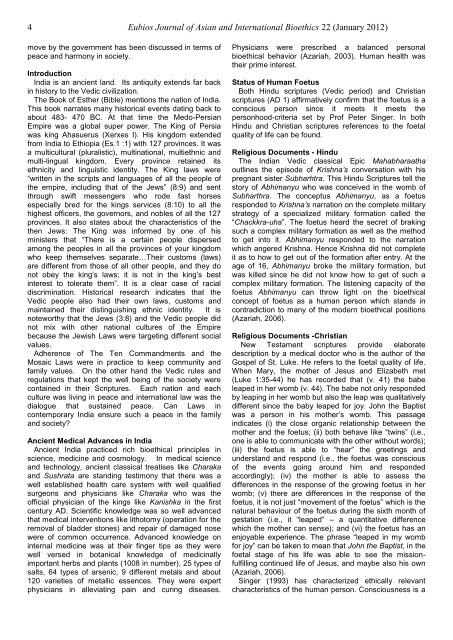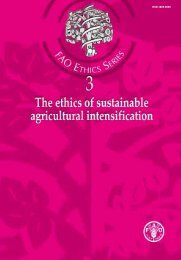Eubios Journal of Asian and International Bioethics - Eubios Ethics ...
Eubios Journal of Asian and International Bioethics - Eubios Ethics ...
Eubios Journal of Asian and International Bioethics - Eubios Ethics ...
Create successful ePaper yourself
Turn your PDF publications into a flip-book with our unique Google optimized e-Paper software.
4 <strong>Eubios</strong> <strong>Journal</strong> <strong>of</strong> <strong>Asian</strong> <strong>and</strong> <strong>International</strong> <strong>Bioethics</strong> 22 (January 2012)<br />
move by the government has been discussed in terms <strong>of</strong><br />
peace <strong>and</strong> harmony in society.<br />
Introduction<br />
India is an ancient l<strong>and</strong>. Its antiquity extends far back<br />
in history to the Vedic civilization.<br />
The Book <strong>of</strong> Esther (Bible) mentions the nation <strong>of</strong> India.<br />
This book narrates many historical events dating back to<br />
about 483- 470 BC. At that time the Medo-Persian<br />
Empire was a global super power. The King <strong>of</strong> Persia<br />
was king Ahasuerus (Xerxes I). His kingdom extended<br />
from India to Ethiopia (Es.1 :1) with 127 provinces. It was<br />
a multicultural (pluralistic), multinational, multiethnic <strong>and</strong><br />
multi-lingual kingdom. Every province retained its<br />
ethnicity <strong>and</strong> linguistic identity. The King laws were<br />
“written in the scripts <strong>and</strong> languages <strong>of</strong> all the people <strong>of</strong><br />
the empire, including that <strong>of</strong> the Jews” (8:9) <strong>and</strong> sent<br />
through swift messengers who rode fast horses<br />
especially bred for the kings services (8:10) to all the<br />
highest <strong>of</strong>ficers, the governors, <strong>and</strong> nobles <strong>of</strong> all the 127<br />
provinces. It also states about the characteristics <strong>of</strong> the<br />
then Jews: The King was informed by one <strong>of</strong> his<br />
ministers that “There is a certain people dispersed<br />
among the peoples in all the provinces <strong>of</strong> your kingdom<br />
who keep themselves separate…Their customs (laws)<br />
are different from those <strong>of</strong> all other people, <strong>and</strong> they do<br />
not obey the king’s laws; it is not in the king’s best<br />
interest to tolerate them”. It is a clear case <strong>of</strong> racial<br />
discrimination. Historical research indicates that the<br />
Vedic people also had their own laws, customs <strong>and</strong><br />
maintained their distinguishing ethnic identity. It is<br />
noteworthy that the Jews (3:8) <strong>and</strong> the Vedic people did<br />
not mix with other national cultures <strong>of</strong> the Empire<br />
because the Jewish Laws were targeting different social<br />
values.<br />
Adherence <strong>of</strong> The Ten Comm<strong>and</strong>ments <strong>and</strong> the<br />
Mosaic Laws were in practice to keep community <strong>and</strong><br />
family values. On the other h<strong>and</strong> the Vedic rules <strong>and</strong><br />
regulations that kept the well being <strong>of</strong> the society were<br />
contained in their Scriptures. Each nation <strong>and</strong> each<br />
culture was living in peace <strong>and</strong> international law was the<br />
dialogue that sustained peace. Can Laws in<br />
contemporary India ensure such a peace in the family<br />
<strong>and</strong> society?<br />
Ancient Medical Advances in India<br />
Ancient India practiced rich bioethical principles in<br />
science, medicine <strong>and</strong> cosmology. In medical science<br />
<strong>and</strong> technology, ancient classical treatises like Charaka<br />
<strong>and</strong> Sushrata are st<strong>and</strong>ing testimony that there was a<br />
well established health care system with well qualified<br />
surgeons <strong>and</strong> physicians like Charaka who was the<br />
<strong>of</strong>ficial physician <strong>of</strong> the kings like Kanishka in the first<br />
century AD. Scientific knowledge was so well advanced<br />
that medical interventions like lithotomy (operation for the<br />
removal <strong>of</strong> bladder stones) <strong>and</strong> repair <strong>of</strong> damaged nose<br />
were <strong>of</strong> common occurrence. Advanced knowledge on<br />
internal medicine was at their finger tips as they were<br />
well versed in botanical knowledge <strong>of</strong> medicinally<br />
important herbs <strong>and</strong> plants (1008 in number), 25 types <strong>of</strong><br />
salts, 64 types <strong>of</strong> arsenic, 9 different metals <strong>and</strong> about<br />
120 varieties <strong>of</strong> metallic essences. They were expert<br />
physicians in alleviating pain <strong>and</strong> curing diseases.<br />
Physicians were prescribed a balanced personal<br />
bioethical behavior (Azariah, 2003). Human health was<br />
their prime interest.<br />
Status <strong>of</strong> Human Foetus<br />
Both Hindu scriptures (Vedic period) <strong>and</strong> Christian<br />
scriptures (AD 1) affirmatively confirm that the foetus is a<br />
conscious person since it meets it meets the<br />
personhood-criteria set by Pr<strong>of</strong> Peter Singer. In both<br />
Hindu <strong>and</strong> Christian scriptures references to the foetal<br />
quality <strong>of</strong> life can be found.<br />
Religious Documents - Hindu<br />
The Indian Vedic classical Epic Mahabharaatha<br />
outlines the episode <strong>of</strong> Krishna’s conversation with his<br />
pregnant sister Subharhtra. This Hindu Scriptures tell the<br />
story <strong>of</strong> Abhimanyu who was conceived in the womb <strong>of</strong><br />
Subharthra. The conceptus Abhimanyu, as a foetus<br />
responded to Krishna’s narration on the complete military<br />
strategy <strong>of</strong> a specialized military formation called the<br />
“Chackkra-uha”. The foetus heard the secret <strong>of</strong> braking<br />
such a complex military formation as well as the method<br />
to get into it. Abhimanyu responded to the narration<br />
which angered Krishna. Hence Krishna did not complete<br />
it as to how to get out <strong>of</strong> the formation after entry. At the<br />
age <strong>of</strong> 16, Abhimanyu broke the military formation, but<br />
was killed since he did not know how to get <strong>of</strong> such a<br />
complex military formation. The listening capacity <strong>of</strong> the<br />
foetus Abhimanyu can throw light on the bioethical<br />
concept <strong>of</strong> foetus as a human person which st<strong>and</strong>s in<br />
contradiction to many <strong>of</strong> the modern bioethical positions<br />
(Azariah, 2006).<br />
Religious Documents -Christian<br />
New Testament scriptures provide elaborate<br />
description by a medical doctor who is the author <strong>of</strong> the<br />
Gospel <strong>of</strong> St. Luke. He refers to the foetal quality <strong>of</strong> life.<br />
When Mary, the mother <strong>of</strong> Jesus <strong>and</strong> Elizabeth met<br />
(Luke 1:35-44) he has recorded that (v. 41) the babe<br />
leaped in her womb (v. 44). The babe not only responded<br />
by leaping in her womb but also the leap was qualitatively<br />
different since the baby leaped for joy. John the Baptist<br />
was a person in his mother’s womb. This passage<br />
indicates (i) the close organic relationship between the<br />
mother <strong>and</strong> the foetus; (ii) both behave like “twins” (i.e.,<br />
one is able to communicate with the other without words);<br />
(iii) the foetus is able to “hear” the greetings <strong>and</strong><br />
underst<strong>and</strong> <strong>and</strong> respond (i.e., the foetus was conscious<br />
<strong>of</strong> the events going around him <strong>and</strong> responded<br />
accordingly); (iv) the mother is able to assess the<br />
differences in the response <strong>of</strong> the growing foetus in her<br />
womb; (v) there are differences in the response <strong>of</strong> the<br />
foetus, it is not just “movement <strong>of</strong> the foetus” which is the<br />
natural behaviour <strong>of</strong> the foetus during the sixth month <strong>of</strong><br />
gestation (i.e., it “leaped” – a quantitative difference<br />
which the mother can sense); <strong>and</strong> (vi) the foetus has an<br />
enjoyable experience. The phrase “leaped in my womb<br />
for joy” can be taken to mean that John the Baptist, in the<br />
foetal stage <strong>of</strong> his life was able to see the missionfulfilling<br />
continued life <strong>of</strong> Jesus, <strong>and</strong> maybe also his own<br />
(Azariah, 2006).<br />
Singer (1993) has characterized ethically relevant<br />
characteristics <strong>of</strong> the human person. Consciousness is a

















